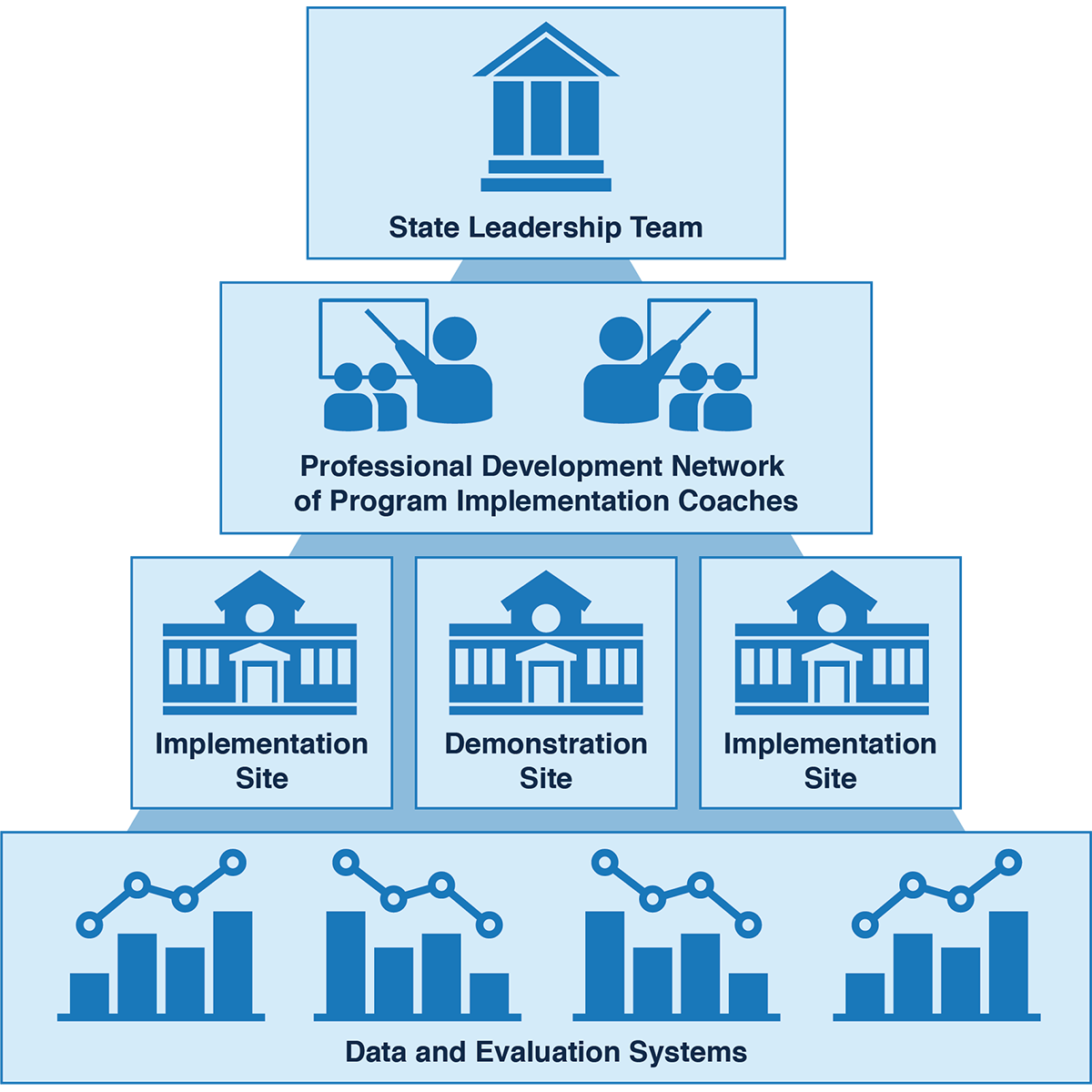Early Childhood Implementation Snapshots, No. 4: Implementation Sites and Demonstration Sites
- updated January 30, 2025
- by Benjamin Riepe



Implementation Sites are local sites or programs selected for the initiative by the State Leadership Team. Sites receive training and coaching on the implementation of the selected evidence-based practices, implementing these with high fidelity, and collecting and reporting data on outcomes. Implementation sites serve as a "laboratory" to identify and solve problems that may arise during program implementation.
Demonstration Sites are implementation sites that are selected to serve as a showplace for high-fidelity implementation. The purpose of demonstration sites is to showcase the practices in use, host tours, promote the initiative, and share their data on implementation and outcomes.
Responsibilities of the Implementation Sites include:
- Oversee program-wide implementation of the practices, led by the Program Leadership Team
- Guide the initiative, assess progress, and plan future actions using the Benchmarks of Quality for Classroom-Based Programs or Home-Visiting Programs, led by the Program Leadership Team
- Provide training and coaching to support practice change, led by the practitioner coaches
- Collect data on the fidelity of program and practice implementation and on child outcomes. Use data for decision-making led by the data coordinators
Demonstration Sites Additional Responsibilities include:
- Share data annually with the State Leadership Team on the outcomes of the selected practices and implementation process
- Share challenges and solutions to implementation and sustainability with the State Leadership Team
- Host visits from policy makers and personnel from other programs interested in implementing the practices
- Partnering with the State Leadership Team to raise awareness of the initiative
Planning Tools
The Importance of Contextual Fit When Implementing Evidence-Based Interventions
This resource defines contextual fit as the match between the strategies, procedures, or elements of an intervention and the values, needs, skills, and resources available in a setting. It proposes a set of core elements drawn from the existing literature that can be used to define contextual fit and guide practice, policy, and research which are: need, precision, evidence-base, efficiency, skills/competencies, cultural relevance, resources and administrative/organizational support. The elements of contextual fit have relevance for:
- the design and selection of interventions,
- the process of initial implementation, and
- the ongoing adaptation of the interventions needed for sustainability.
Voices from the Field: Iowa

Program Implementation Coaches Sharon Helt and Terri Novak-Cicha of the Iowa City School District have been passionate about the implementation of Pyramid Model practices for several years. In order to become a community partner and receive funding, programs also agreed to attend Pyramid Model training. The Program Implementation Coaches provided teaching teams practice-based coaching, planned professional development experiences, and other incidental learning opportunities.
 Sharon Helt
Sharon Helt
 Terri Novak-Chicha
Terri Novak-Chicha
Their work paid dividends in student outcomes. Public school teachers began noticing that the students who came from Pyramid Classrooms arrived in kindergarten with a variety of highly valued skills and began asking what was being done in preschool to prepare these children. Kindergarten teachers were interested to learn how children were included in preschool. They asked about the strategies used to engage children with identified special needs into the daily routines. The summer of 2019 Terri and Sharon developed a weeklong learning lab for kindergarten teachers. In the lab, the kindergarten teachers role played as students. They practiced using the visuals and supports students would use and reflected on how it felt. Teachers were provided time to make and take materials and collaborate with their team. In the afternoon students arrived so teachers could observe the practices in action.
During the 2020–2021 school year, Terri and Sharon saw the use of remote trainings as an opportunity to address a need on the Benchmarks of Quality to provide more choices and differentiate trainings. The learning needs of staff were addressed by involving teacher-leaders who are part of their Program Leadership Team. Terri and Sharon organized the training with the assistance of the teacher-leaders. They chose presentation topics based on data from Teaching Pyramid Observation Tool observations, as well as other district data collection tools and selected classroom staff that were demonstrating exemplar implementation of identified topics of pyramid model practices to train their collogues. Trainings were done in large and small groups and covered topics such as:
- Peer mediated interventions,
- Pyramid practices,
- Differentiation for children in curricular areas, or might provide opportunities to Collaboration with specialists.
- Speech-Language Pathologists came in to provide training on the use of their Core Board communication system and provided mini-trainings on building relationships.
- Whole group meeting on the use of Behavior Incident Reports
Considerations
- Representation of children, families and staff in program leadership and implementation support teams strengthens your decision-making and implementation. Families have direct knowledge and experiences of the communities you serve so they can help you recognize gaps and barriers in the system. Provide multiple means for participation (virtual, in person) to support families to become and remain engaged in decision making (for example, input on the developing program wide expectations and rules for children and families). Families are actively involved in goal setting for children, share information used in the development of classroom routines, and are encouraged to be active members of the learning community to their level of comfort.
- Identify and eliminating practices and processes that contribute to suspension, seclusion or expulsion of children with disabilities. Iowa coaches (above) provided trainings for the use of BIR data and a modeled a culture that embraces the examination of data for continuous improvement.
- Cultural contexts of families and communities are considered. Discussions about culture are revisited in professional development experiences as part of the routine of trainings and coaching. In the example above, highlighting the skills of teacher-leaders, para educators, and specialists encourages teams to value the knowledge that each team member brings.
Considerations for Policy
Programs that adopt and implement evidence-based practices, which are proven as viable solutions, should adopt new or amend current state policy to ensure sustainability. Ongoing evaluation of the policy should occur to verify whether implementation and its effects are aligned with the objectives that were explicitly or implicitly set out.
References
- Statewide Implementation Guide. (2019). ECTA Early Childhood Technical Assistance Center. https://ectacenter.org/sig
The contents of this page were developed under cooperative agreements from the U.S. Department of Education, #H326P17001 (ECTA Center), and #H326B170003 (NCPMI), from the Office of Special Education Programs, U.S. Department of Education. However, these contents do not necessarily represent the policy of the U.S. Department of Education, and you should not assume endorsement by the Federal Government.

